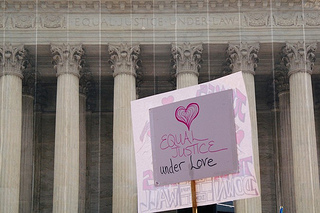Just before Christmas, marriage equality arrived in the most unlikely of states.
In 2004, Utah voters approved Amendment 3 to the state constitution defining marriage as between one man and one woman by a 66-34% margin. On December 20, U.S. District Judge Robert Shelby struck down that provision an unconstitutional violation of the 14th Amendment's Equal Protection Clause. This decision marks the first time a federal judge has ruled on marriage equality on Constitutional grounds as a "fundamental right" and that there was no "rational basis" in refusing to grant it to gay couples, a departure from the Supreme Court's decision in Windsor in 2013 that maintains that regulation of marriage is in the purview of the states and not the federal government.
Immediately thereafter, hundreds of gay couples lined up in courthouses around the state to get marriage licenses as the state filed an appeal with the U.S. Court of Appeals for the 10th Circuit. What followed was a series of appeals to three levels to attempt to stop county clerks from issuing licenses to gay couples:
- December 22: The 10th Circuit rejected a motion for a stay for technical reasons.
- December 23: Judge Shelby declined to grant a stay (delay) of his decision, which means same-sex marriages could continue while the appeal is pending. The 10th Circuit also denied a motion for a temporary stay.
- December 24: The 10th Circuit rejected an emergency order to stay Judge Shelby's decision.
- December 31: Utah requested the U.S. Supreme Court for a stay.
Finally, on January 6, 2014, the U.S. Supreme Court granted Utah's request for a stay, ending the issuance of marriage licenses to gay couples. However, some 1,000 couples who had already taken vows remain legally married. Those who did not must now wait for the 10th Circuit to rule sometime in the next few weeks.
This blog is an advertisement for the Law Office of Philip R. Yabut, PLLC, and the information in this post is not to be construed as legal advice, nor does reading it form an attorney-client relationship. Please do not post confidential information in the comments section.
Philip R. Yabut, Esq. || 1100 N. Glebe Road, Suite 1010, Arlington, VA 22201 || (571) 393-1236 || pyabut@prylaw.com

 This morning, the Supreme Court struck down provisions of the 1996 Defense of Marriage Act (DOMA) as unconstitutional. In a 5-4 opinion, Associate Justice Anthony M. Kennedy, writing for the majority, states that "DOMA is unconstitutional as a deprivation of the liberty of the person protected by the Fifth Amendment of the Constitution." In the other marriage equality case, also a 5-4 decision (Chief Justice John G. Roberts writing for the majority), the Court ruled that the petitioners in the California Proposition 8 case did not have standing to appeal, which means that the trial court's decision invalidating Proposition 8 stands and California can resume recognition of same-sex marriages.
This morning, the Supreme Court struck down provisions of the 1996 Defense of Marriage Act (DOMA) as unconstitutional. In a 5-4 opinion, Associate Justice Anthony M. Kennedy, writing for the majority, states that "DOMA is unconstitutional as a deprivation of the liberty of the person protected by the Fifth Amendment of the Constitution." In the other marriage equality case, also a 5-4 decision (Chief Justice John G. Roberts writing for the majority), the Court ruled that the petitioners in the California Proposition 8 case did not have standing to appeal, which means that the trial court's decision invalidating Proposition 8 stands and California can resume recognition of same-sex marriages.







